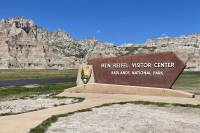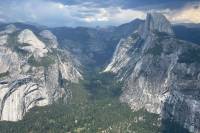From the Rio Grande to the Chisos Mountains: A Guide to Big Bend National Park in Texas
Located on the border of Mexico in the southwest corner of Texas, Big Bend National Park offers plenty of camping, hiking, backpacking, rafting, and more.
Recognized as a unique and stunning landscape worth protecting, this area where the Rio Grande River bends in the west of Texas was preserved as a state park in 1933. Ten years later, in June of 1944, it became Big Bend National Park.
It protects the Chihuahuan Desert and the whole Chisos mountain range — in fact, it’s the only national park to protect an entire mountain range.
This park has always had people and animals living off the land. There are archeological sites, mining and ranching artifacts, sea fossils, and even dinosaur bones. The Quetzalcoatlus — at one time the largest flying creature in the world — was found in Big Bend in 1971, and there’s a special exhibit of its bones inside the park.
This article will cover how to get to the park, when to go, where to go, and what to do — so you can easily plan your next national park experience in Big Bend.
A Guide to Big Bend National Park in Texas

How to Get There
The Midland and El Paso airports are your best options for flying, but then you will need to get a rental car to drive another three and a half or five hours, respectively.
There are a few amenities in the park, small convenience stores, and two gas stations (at Panther Junction and Rio Grande Village), but it’s still a good idea to fill up on gas and food before you enter the park.
When to Visit
The best time to visit is from fall to spring during the milder months. My boyfriend and I went at the end of July this past year (which was way too hot), but fortunately, my first time visiting was in March a previous year — when the temperature is cooler but it’s still sunny.
Where to Go and What to Do
There are four visitor centers in the park. Persimmon Gap Visitor Center is the first visitor center you’ll see if you enter through the north gate. It’s open seasonally, typically from November 1 to May 29. You can pick up a map as you head into the park.
Panther Junction Visitor Center is in the middle of the park’s main roads, and people visit to pick up Junior Ranger booklets, stop at the gift shop, mail a letter at the post office, take the short nature walk, and fill up on water. It’s open year-round, and this is where you’ll get backpacking and river use permits issued.
Chisos Basin

Chisos Basin Visitor Center is 10 miles Southwest of Panther Junction. The road going up into the Chisos Mountains is steep with sharp curves, so it’s not recommended for trailers longer than 20 feet or RVs over 24 feet. You can pick up your backpacking permit here, as many of the trails begin from this location.
The Chisos Basin Campground has 56 campsites; reservations are required. Two-thirds of the sites are reservable up to 6 months to the date and the other third are reservable up to 14 days in advance. There are also seven group campsites in Chisos Basin for groups of nine to 20. Reservation information for these campsites can be found at recreation.gov.
The Chisos Mountains Lodge offers 72 non-smoking rooms, a restaurant, laundry services, and limited Wi-Fi. Check nationalparkreservations.com or call (855) 584-5295 for dates and rates.

Backpacking
My boyfriend and I prefer backpacking when we can, so we spent 3 nights backpacking a loop that included Emory Peak (the highest point in the park) and the South Rim in Chisos Basin.
There are hundreds of miles to backpack and specific sites to reserve. You can obtain a permit up to 6 months in advance on recreation.gov or go to the Panther Junction or Chisos Basin Visitor Centers for a walk-up permit.
Santa Elena Canyon, Ross Maxwell Scenic Drive
The Ross Maxwell Scenic Drive is a can’t-miss activity when visiting Big Bend National Park. The drive culminates at the Castolon Visitor Center is in the Castolon Historic District, which exhibits history from the farming and military days. This destination is 35 miles from Panther Junction. People typically stop here on the way to Santa Elena Canyon.
The visitor center is only open in the cooler months (November 1 to May 29), and you can pick up your river use permit there.

Hiking
While there are numerous overlooks along the drive, Santa Elena Canyon is the hike you should make time to do. The beginning is beautiful as the Rio Grande goes through the canyon walls. The trail is short and steep at first but then levels out as you follow the river into the canyon.
Old Maverick Road is one of the many backcountry roads in the park, and it connects Santa Elena Canyon to Maverick Junction. The road is a 14-mile, rough dirt road with a few primitive campgrounds. Remember to reserve a backcountry permit for those sites.
Rafting
There are five different canyons to float through on the Rio Grande with varying degrees of difficulty: Boquillas (up to Class II), Mariscal (shorter canyon with Class I-III), Santa Elena (Class I-II), Hot Springs and San Vicente (Class I-II), and The Lower Canyons (more difficult, Class II-IV).
You must have a backcountry permit and specific boating equipment for any trip on the river. The different canyons offer options for float or raft trips anywhere from 2-10 days. Hot Springs Canyon is closed to overnight camping, allowing day trips only.
Rio Grande Village
The Rio Grande Village Visitor Center is 20 miles east of Panther Junction, and you can pick up river permits there too. A village store right down the road offers a small selection of goods, and showers and laundry (for a fee) next door.
The Rio Grande Village Campground has 93 sites; reservations are required. A group tent site is also available with reservations, and an RV-specific campground with 25 full hook-up sites is down the road.
You can travel to Boquillas, Mexico, for a small fee by taking a boat over the Rio Grande and then walking into town. Check the seasonal dates to see if the border crossing is open, and remember your passport. There are also hot springs in that area to enjoy.
Lastly, if you like dinosaurs, visit the Fossil Discovery Exhibit, where the 35-foot-winged flying Quetzalcoatlus hangs from the exhibit ceiling. This stop is right off Route 385, the road that connects the town of Marathon to Panther Junction.
Big Bend National Park in Texas: Conclusion

Big Bend was a park that I had not heard much about prior to my visit, but I absolutely loved it. Backpacking in the Chisos Mountains was the best way to enjoy the park for my first experience, and I was excited to return this past summer.
I recommend choosing one area to experience — Rio Grande Village, Chisos Mountains, or Santa Elena Canyon — each day of your visit. Almost everything requires reservations and permits, so you should plan ahead. I also recommend planning your visit for the spring or fall (outside of the high heat of summer) to enjoy this beautiful park.
The post From the Rio Grande to the Chisos Mountains: A Guide to Big Bend National Park in Texas appeared first on GearJunkie.


